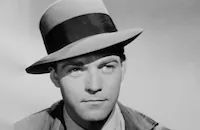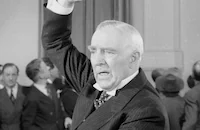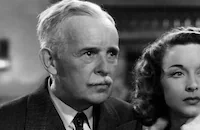Good Girls Go to Paris

Brief Synopsis
Cast & Crew
Alexander Hall
Melvyn Douglas
Joan Blondell
Walter Connolly
Alan Curtis
Joan Perry
Film Details
Technical Specs

Synopsis
Ronald Brooke, an English exchange professor at a Midwestern college, is astounded at waitress Jenny Swanson, whose ambition is to gold-dig her way to Paris. Jenny begins to realize her dream when Ted Dayton, the son of a millionaire, hits her with his car and she entices him into a marriage proposal. When her conscience prevents her from going through with a breach of promise suit, Ronnie counsels her that good girls go to Paris too, and then informs her that he is leaving town to marry Sylvia Brand. Jenny, under orders from Mr. Dayton, must leave town also, and en route to New York, she meets Tom Brand, the spendthrift grandson of millionaire Olaf Brand and brother of Sylvia. Upon reaching New York, Tom and Jenny go nightclubbing, where Jenny learns that Sylvia is in love with Dennis Jeffers, the butler's son, but fears that her grandfather will disinherit her if they marry. That night, Tom becomes so drunk that Jenny takes him home to the Brand mansion, where she meets Tom's mother Caroline, who introduces Jenny to the irascible Olaf as Sylvia's roommate. Olaf welcomes Jenny into the house when she prescribes old Swedish remedies for his imagined ills, and soon she gets Tom out of a jam involving a gambling debt. She also ruins the plans of gigolo Paul Kingston, who intends to attach himself to the Brand millions by romancing Caroline. After Jenny prods Sylvia into admitting her love for Dennis, Ronnie proposes to Jenny, promising her a honeymoon in Paris.

Director

Alexander Hall
Cast

Melvyn Douglas

Joan Blondell

Walter Connolly

Alan Curtis

Joan Perry

Isabel Jeans
Stanley Brown

Alexander D'arcy
Henry Hunter

Clarence Kolb

Howard Hickman
Richard Fiske

Robert Sterling
Beatrice Curtis
Leon Belasco
Barlow Borland
Crew
Lionel Banks
Al Clark
Lenore Coffee
William Joyce Cowen
Ken Englund
Henry Freulich
Jack Goodrich
Kalloch
Gladys Lehman
William Mull
William Perlberg
M. W. Stoloff

Film Details
Technical Specs

Articles
Good Girls Go to Paris
By Frank Miller

Good Girls Go to Paris
Quotes
Trivia
Originally titled "Good Girls Go To Paris, Too," but the censors objected.
Notes
According to a pre-production news item in Hollywood Reporter, Jean Arthur was slated to star in this picture. The item also noted that Boyce De Gaw and Isabel Dawn were to have written it, but they are not credited on screen, in Screen Achievements Bulletin or in reviews. The Variety review notes that this was Joan Blondell's first film for Columbia.














